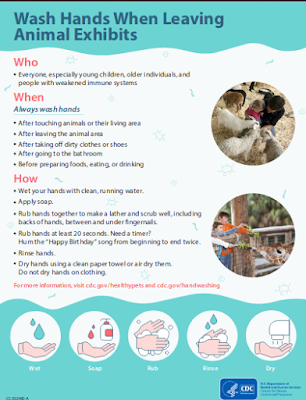#14,180
For the past 10 days we've been following an outbreak of Shiga-toxin-producing E. coli (STEC) among children who recently attended - and had animal contact - at the San Diego County Fair. Sadly 1 child has died, while three have been hospitalized.
Our last update (see San Diego: 2 More Probable Pediatric E. coli STEC Cases Linked To County Fair), on July 6th, raised the total to 4 confirmed and 3 probable cases.San Diego's HHSA has now announced that the total now stands at 10 confirmed, and 1 probable case.
Shiga toxin-producing E. coli
On June 28, 2019, the County of San Diego Health and Human Services Agency (HHSA) reported four confirmed or probable pediatric cases of Shiga-toxin-producing Escherichia coli (STEC) that may be related to contact with animals at the San Diego County Fair.
As of July 10, 2019, 10 confirmed cases and one probable case have been reported in this outbreak. Three people were hospitalized and one child has died.
The source of the E. coli bacteria is under investigation, but all children were reported to have visited the animal areas, the petting zoo, or had other animal contact at the San Diego Fair. The San Diego County Fair came to its 2019 season close on July 4th. County Environmental Health also re-inspected food facilities visited by the children and found no link to the cases.
Symptoms of STEC infection
People with a STEC infection usually start feeling sick 3-4 days after eating or drinking something that contains the bacteria. However, illness can start anywhere from 1-10 days following exposure. Symptoms vary, but often include:
Fever, if present, is usually not very high (less than 101˚F/38.5˚C). Most people get better within 5-7 days. However, some infections can be severe or life-threatening. Please contact your health care provider if you have experienced these symptoms on or after June 8, and especially if you have diarrhea that lasts for more than 3 days or diarrhea that is accompanied by a fever higher than 102˚F, or blood in the stool, or so much vomiting that you cannot keep liquids down and you pass very little urine.
- Severe abdominal cramps
- Watery or bloody diarrhea (3 or more loose stools in a 24-hour period)
- Vomiting
Preventing STEC infection
One of the best ways to help prevent infection with STEC is frequent and proper handwashing. Always wash your hands thoroughly after contact with animals or their environments (at farms, petting zoos, fairs, even your own backyard). Everyone, especially young children, older individuals, and people with weakened immune systems, should wash their hands before eating or drinking. Thorough handwashing means using plenty of soap, warm water, and scrubbing all surfaces of the hands (including between the fingers), for at least 20 seconds.
For more information about STEC infection and how to prevent it, please see the sections below.
(Continue . . . )
According to the CDC, animals most likely to carry E. coli O157 include:
And those must vulnerable to infection include:
- cows, especially calves
- goats
- sheep
- deer.
- Children younger than 5 years of age
- Adults aged 65 and older
- People with weakened immune systems, including pregnant women
- People who travel to certain countries
Normally this time of year we're talking about the (admittedly low) risks of contracting avian of swine influenza from livestock at county and state fairs, and how to prevent it (see Biosafety At The Fair This Summer).
But outbreaks like this remind us of the importance of practicing good hand hygiene year round, and not just during cold and flu season. According to the CDC:
- Before, during, and after preparing food
- Before eating food
- Before and after caring for someone who is sick
- Before and after treating a cut or wound
- After using the toilet
- After changing diapers or cleaning up a child who has used the toilet
- After blowing your nose, coughing, or sneezing
- After touching an animal, animal feed, or animal waste
- After handling pet food or pet treats
- After touching garbage
In a somewhat related story, the CDC is investigating a multi-state outbreak of Multidrug-Resistant Salmonella Infections Linked to Pig Ear Dog Treats. At least 45 people have been infected, and 12 hospitalized.
Which is why I keep hand sanitizer at my desk, and carry a small bottle of it whenever I leave the house.
